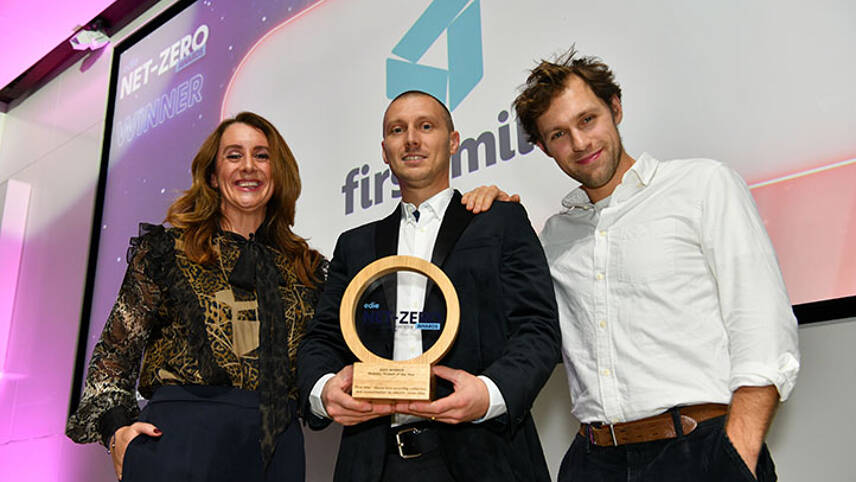This premium content is exclusive to edie Members.
To find out more about edie Membership, please click below.
If you are an existing member, login here

At a glance:
Who: First Mile
What: Electric cargo bike delivery scheme
When: October 2022
Where: UK
Why: Decarbonise transport emissions
The challenge
City centres are hotspots for air pollution and many are implementing charges on polluting vehicles in a bid to drive the uptake of zero emission vehicles.
The solution
As more urban areas and city centres crackdown on polluted vehicles, many organisations are turning to zero-emission vehicles. First Mile is one of these companies, which is tackling air and noise pollution, addressing emissions from trucks in dense traffic and complying with tight council timebands in order to handle waste.
How it works
First Mile started using electric cargo bikes in mid-2022 to collect waste and recycling from businesses across Central London and has since rolled out a whole programme to improve the process.
Each custom-built electric cargo bike can carry 200kg of waste, while working silently across the capital with zero emissions. Each bike operates on one small battery charge, covering 25 miles daily – an ideal operational urban-collection range.
However, First Mile has an additional challenge in that it manages waste. Waste consolidation is the process of combining smaller amounts into larger loads in order to improve recycling rates and make waste both easier to handle, and more cost and environmentally effective to transport.
First Mile segregates sacks at consolidation sites, before a dedicated compactor collects the appropriate stream for processing and recycling at dedicated facilities. These can include anaerobic digestion for food, for example.
One e-bike is capable of collecting 45 sacks, or roughly 200kg of waste. First Mile also claims that one bike can do the work of one traditional cage truck, or two bikes the work of one compactor truck, without worrying about the associated emissions or pollution.
First Mile ensures that every bike is loaded to its maximum capacity so it can remove as many trucks as possible from London’s streets. This means that net-zero principals are prioritised by the objective of suppressing as many trucks as possible that are operating in Central London.
Additionally, the programme has created a new pipeline of accessible jobs as drivers do not need licenses for the cargo bikes. First Mile can also turn to underutilised and undeveloped brownfield sites in London to be used as consolidation sites.
Another added benefit of the process is that waste is segregated by stream at the consolidation point, avoiding sending contaminated waste to processing partners.
The project is managed by a dedicated project manager from the First Mile strategy team, and is being delivered ahead of timeline – First Mile has 11 e-bikes on the road already, despite targeting 10 by the end of 2023.
Looking ahead, First Mile is identifying further consolidation points in Central London where it can put 1100L bins for bikes to tip every 45 bags of waste they collect
The results
According to First Mile, one bike has the same capacity as a 3.5 tonne van-sized vehicle, while saving 20.26 kg of CO2 emissions daily. The fleet is ULEZ compliant and congestion charge exempt.
First Mile has deployed 11 daily bike collection rounds and two bike delivery rounds, eliminating 10 diesel trucks and two sack delivery vans from London’s streets. As of July 2023, First Mile collects waste using bikes from 1,430 customers.
The switch to cargo bikes has avoided more than 500,000 kg of CO2 emissions to date.
The organisation
These bikes will help First Mile towards an objective to fully decarbonise its fleet in the next five years. It is estimated that First Mile will save 250,000 road miles of truck use in 2023 with this project.
The next goal is to increase the cargo bike fleet to 35 by the end of 2024, which will eliminate 30 trucks from London’s streets. Longer-term, First Mile is aiming to have 75 operational bikes within five years.
The judges said:
“First Mile provided a different approach to waste collection, by e-cargo bike. The versatile vehicle, which is surprisingly able to carry 200kg of waste, is good for the narrow, often obstructed roads in central London.
“This addresses congestion, localised air pollution and climate emissions. The e-bike rounds have eliminated the need for 10 diesel trucks and, with over 1,000 happy customers, this obviously still offers good service delivery.”
© Faversham House Ltd 2024 edie news articles may be copied or forwarded for individual use only. No other reproduction or distribution is permitted without prior written consent.

